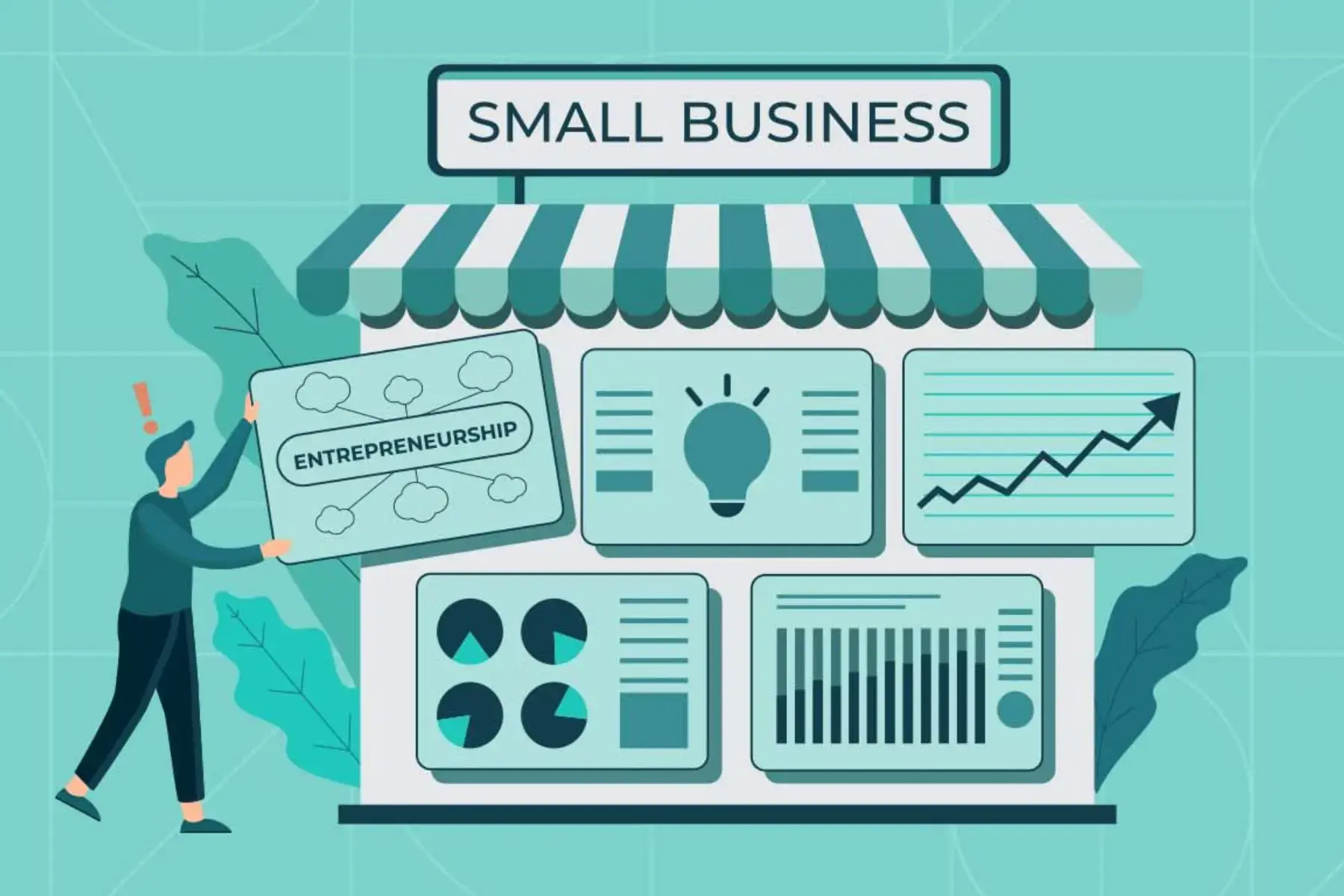Affordable Websites for Small Businesses: Your Key to Online Growth
Building an affordable website for your small business is no longer a challenge. Here’s everything you need to know to create a cheap yet effective web presence.
Posted by
 Sabyr Nurgaliyev
Sabyr Nurgaliyev
Introduction
In today’s digital world, having a website is like having a virtual storefront. For small businesses, it’s more than just a pretty page; it’s a tool to capture leads, grow your brand, and ultimately boost sales. But hey, the idea of setting up a website may sound expensive, right? Well, it doesn’t have to be! The good news is there are affordable options for small businesses to establish their online presence without draining the bank. In this article, we’ll dive into how you can get a cheap website for small businesses and why it’s so important.
Why Do Small Businesses Need a Website?
Let’s be honest, can your business really thrive without a website today? No way. Your customers are online, browsing, researching, and making decisions faster than ever before. A website helps you:
- Attract new customers
- Showcase your products or services
- Build credibility
- Increase accessibility, even outside of working hours
But the magic lies in making this affordable. After all, not every small business has a massive marketing budget, and that’s perfectly okay.
How Much Does It Cost to Build a Website?
You might be asking yourself, “How much is this really going to cost me?” Well, it all depends on what you need. On average, building a website for a small business could cost anywhere from a few hundred to several thousand dollars. But, if you know where to look, you can drastically cut these costs.
Here’s a quick breakdown:
For DIY websites using platforms like Wix or Squarespace, you can expect to pay between $10 to $50 per month. If you prefer a custom website built by hiring a developer, costs typically range from $500 to $10,000 or more. Alternatively, Subpage.io offers a 1-Year Pass for $25 or a Lifetime Deal for $45.
As you can see, options like Subpage.io are wallet-friendly and let you build your own landing page in no time. So, don’t let the numbers scare you—there’s a fit for every budget.
Choosing the Right Website Builder for Your Small Business
Now, you’ve probably heard of platforms like Wix, Squarespace, and WordPress. These are great choices, but let’s take a look at what fits best for cheap websites for small businesses.
DIY Website Builders
These platforms let you build your website by dragging and dropping elements. No coding experience? No problem. You can create a website in just a few hours. Here’s what you should know about some of the top choices:
- Wix: Perfect for beginners. It’s easy to use and offers a wide range of templates.
- Squarespace: Known for its sleek design templates. It’s ideal if you want a professional look with minimal effort.
- WordPress: For those who want full control and flexibility, WordPress offers powerful tools but might require some learning curve.
- Subpage.io: A simple and affordable option for creating landing pages without coding skills. It’s perfect for small businesses looking to establish an online presence quickly.
Custom Websites: Are They Worth It?
While custom websites offer complete flexibility and uniqueness, they come at a price. If your small business is just starting out, this might not be the most cost-effective option. It’s always better to start with an affordable website builder and scale as your business grows.
Understanding Domain Names and Hosting
Before you jump into designing your website, you’ll need to purchase a domain name. Your domain is like your business address on the internet, and hosting is where all your website files live. Here’s how you can choose wisely:
- Domains: Buy from trusted registrars like Namecheap or GoDaddy. Costs range from $10 to $15 a year.
- Hosting: If you’re not using an all-in-one website builder like Wix, you’ll need hosting. Bluehost and HostGator are budget-friendly options, starting at around $3/month.
Can You Use Free Domain Names?
While it’s tempting to opt for free domain names (like “yourbusinessname.wix.com”), it’s not advisable for a professional small business website. A custom domain looks more credible and helps with SEO, which leads to more traffic.
The Importance of Mobile-Friendly Design
Over 50% of global web traffic comes from mobile devices. That means your website has to be mobile-friendly, or you risk losing potential customers. Most website builders, like Wix and Subpage.io, offer responsive designs out of the box, ensuring your site looks great on smartphones and tablets.
Optimizing for Mobile
- Keep your design simple and clean
- Make buttons large enough for easy clicking
- Ensure fast loading times by optimizing images and content
Remember, people won’t wait around for a slow-loading page. The faster, the better!
SEO: Getting Your Website Found
It’s one thing to have a website, but if no one can find it, what’s the point? SEO (Search Engine Optimization) is key for getting your website ranked on Google and other search engines. Here are some basic tips to get started:
- Use relevant keywords (e.g., “cheap websites for small businesses”)
- Optimize meta descriptions
- Include internal and external links
- Make sure your images have alt text
- Speed matters, so minimize loading time
How to Track Your SEO Performance
Once your website is live, don’t forget to keep an eye on its performance. Tools like Google Analytics and Google Search Console are free and provide valuable insights into who’s visiting your site and how they’re finding you.
Integrating Social Media
A website alone isn’t enough. You’ll also want to integrate social media channels, especially if you’re on a tight budget. It’s free advertising! You can:
- Add social sharing buttons
- Display your Instagram feed on your website
- Share your blog posts on Facebook and LinkedIn
Why Social Proof Matters
People trust recommendations. By showcasing testimonials or reviews on your website, you’ll build credibility. Plus, a good review is like word-of-mouth marketing—priceless!
Subpages and Their Role in SEO
Creating multiple pages or subpages on your website can help with SEO by organizing your content into sections that search engines can index more easily. For example, if you’re a bakery, you could have subpages for “Custom Cakes,” “Wedding Cakes,” and “Cupcakes.” Each page would target specific keywords, helping you rank better on search engines.
Subpage.io: An Affordable Solution
Subpage.io lets you create landing pages without coding skills. Their pricing plans are ideal for small businesses that need a simple, yet effective online presence. It’s a great option if you’re just getting started and don’t need a fully customized website right away.
Security: Keep Your Website Safe
Small businesses are not immune to cyber threats. In fact, they’re often targeted because they’re perceived as less secure. Protecting your website is crucial for building trust with your customers. Here’s what you can do:
- SSL Certificate: Make sure your site is secure (you know, the little lock symbol next to your URL). It’s a must for any business website.
- Regular Backups: Always back up your site to prevent data loss.
- Firewall Protection: Many hosting services offer firewalls to block malicious traffic.
Security Plugins
If you’re using WordPress, there are several plugins like Wordfence that can help secure your site from hackers. For non-WordPress sites, check with your hosting provider for security features.
FAQs
1. How much should a small business website cost?
It can range from as low as $10/month with DIY platforms to over $10,000 for custom designs. Budget-friendly options like Subpage.io are available for as little as $25/year.
2. Is it possible to build a website without coding skills?
Absolutely! Platforms like Wix, Squarespace, and Subpage.io offer easy-to-use interfaces, letting you drag and drop your way to a functional website.
3. What’s the best platform for a cheap website for a small business?
It depends on your needs, but platforms like Subpage.io and Wix are known for their affordability and ease of use.
4. Do I need a professional designer to create a business website?
Not necessarily. Many DIY platforms provide professional-looking templates, so you can build your own site without hiring a designer.
5. How can I ensure my website ranks well on Google?
Start with SEO basics—use relevant keywords, optimize meta descriptions, and ensure fast loading speeds. Tools like Google Analytics can help you track progress.
6. Are custom domains necessary for small businesses?
Yes! A custom domain looks more professional and helps with SEO, making it easier for customers to find you online.
Conclusion
Building a cheap website for small businesses doesn’t have to be complicated or costly. With the right tools, a bit of creativity, and some SEO know-how, you can create an online presence that’s both affordable and effective. Don’t forget to explore different platforms like Subpage.io to get the most value for your money. After all, it’s not just about getting online—it’s about being seen.
External Links:
Related Articles

Discover how small businesses can create affordable, high-quality websites. Learn about cost-effective strategies, essential features, and tools to build a robust online presence.
 Sabyr NurgaliyevNov 6, 2024
Sabyr NurgaliyevNov 6, 2024
Explore the best and most budget-friendly website solutions tailored for small businesses to thrive online.
 Sabyr NurgaliyevNov 3, 2024
Sabyr NurgaliyevNov 3, 2024
Explore budget-friendly website options for small businesses that boost visibility and functionality without breaking the bank.
 Sabyr NurgaliyevNov 2, 2024
Sabyr NurgaliyevNov 2, 2024
Learn how small businesses can create cost-effective, high-quality websites using various platforms and approaches.
 Sabyr NurgaliyevNov 1, 2024
Sabyr NurgaliyevNov 1, 2024
Explore affordable ways small businesses can build impactful websites, optimize SEO, and create a strong online presence.
 Sabyr NurgaliyevOct 31, 2024
Sabyr NurgaliyevOct 31, 2024
An in-depth look at creating affordable, effective websites for small businesses, including strategies, tips, and essential resources.
 Sabyr NurgaliyevOct 30, 2024
Sabyr NurgaliyevOct 30, 2024